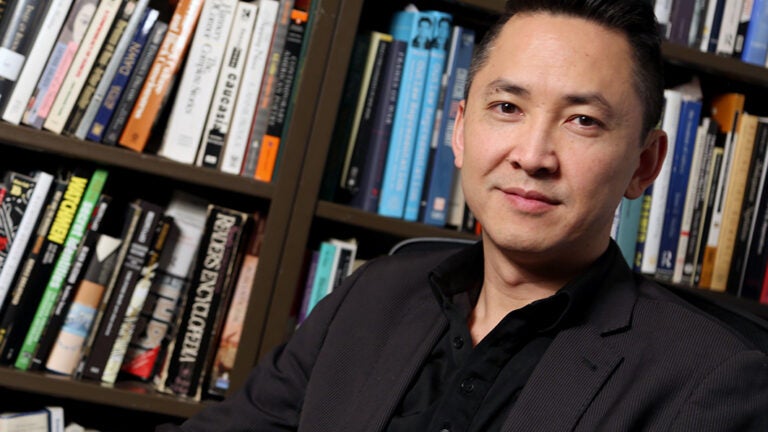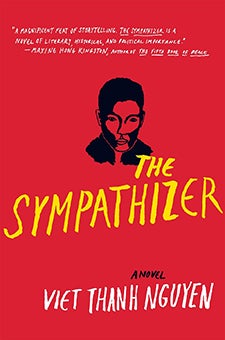
USC Dornsife’s Viet Thanh Nguyen wins Pulitzer Prize for Fiction
The 2016 Pulitzer Prize for Fiction, one of America’s most prestigious literary honors, has been awarded to Viet Thanh Nguyen, associate professor of English and American studies and ethnicity at USC Dornsife. Nguyen won the award for his first novel, The Sympathizer (Grove Press, 2015), which explores the Vietnam War through the lens of his conflicted protagonist, an American-educated spy for the Viet Cong.
Nguyen’s Pulitzer Prize win puts him in the illustrious company of such doyens of American literature as John Steinbeck, William Faulkner, Ernest Hemingway, Saul Bellow, Edith Wharton, Harper Lee, Cormac McCarthy, Alice Walker and Toni Morrison — all of whom are previous Pulitzer recipients.
“We are delighted that Professor Nguyen has been chosen for this most prestigious of honors,” said Dani Byrd, interim dean of USC Dornsife. “Through its powerful voices and adept storytelling, Professor Nguyen’s The Sympathizer brings its readers to see history in a new and personal light. The Pulitzer Prize is a worthy acknowledgment of the profound impact of his widely-read and lauded first novel.”
Speaking from Cambridge, Mass., where he is currently on a book tour to promote the paperback version of The Sympathizer and his new book, a nonfiction cultural companion to his novel titled Nothing Ever Dies: Vietnam and the Memory of War(Harvard University Press, 2016), Nguyen said he was stunned to have won the Pulitzer.

“It’s a great honor. I wrote the novel for myself, so it’s wonderful to know that the novel has been able to reach other readers out there who have found something significant in it,” said Nguyen, interim chair of American studies and ethnicity.
“I went into this novel wanting to write without compromise, without worrying about what other people would think because the novel is meant to be provocative and it’s meant to be critical of all sides who were involved in this war, so there is something here for everyone to dislike. It’s also meant to be as honest and as truthful and as painful of a novel as I could write and there was no way I could do that if I had to worry about what an audience would think. I just had to believe that I could write with utter conviction and hope that some group of readers would come along with me.”
Nguyen said that winning the Pulitzer felt like a victory.
“I see myself as part of a larger movement of writers of color, of Asian American writers who have collectively been trying so hard to bring different voices and perspectives to American audiences and have often felt overlooked or marginalized in different ways,” he said. “So any story that can do that and can provide American audiences with a story that will challenge them is an accomplishment, not just for the individual author, but for all these different literary movements that have shaped and sustained me.
“I hope that this an award that marks the necessity in American literature for paying attention to diverse voices that will illuminate American history in important and challenging ways for American audiences.”
Nguyen also paid tribute to the support he received from USC Dornsife.
“It has been a very supportive institution that has given me many research leaves and funds, which I have used to travel throughout South East Asia and which were crucial to the writing of this book,” he said. “USC Dornsife’s creative writing program and in particular Tom [T. C.] Boyle have been very supportive. Tom was an early champion of the book, and for that I am always going to be grateful.”
David St. John, University Professor of English and Comparative Literature and chair of English, lauded Nguyen’s unique voice.
“Viet’s extraordinary novel was written from an intensely individual perspective and from his own insistent writerly solitude, one that reflects the fiercely imagined singularity of his book’s main character,” St. John said. “As in The Sympathizer, every spy is, in the end, alone, as is perhaps every great writer — and make no mistake, with this single novel, Viet has already staked his claim as a great writer.”
The Pulitzer Prize for Fiction recognizes distinguished fiction by an American author, preferably dealing with American life, published during the preceding calendar year. It is one of the seven American Pulitzer Prizes that are annually awarded for letters, drama, and music. As the Pulitzer Prize for the Novel, it was one of the original Pulitzers inaugurated in 1917, although no Novel prize was actually awarded until the following year.
The Sympathizer has also won the First Novel Prize from the Center for Fiction, the Andrew Carnegie Medal for Literary Excellence from the American Library Association, and the Asian/Pacific American Award for Literature in Fiction from the Asian/Pacific American Librarians Association. A finalist for the Edgar Award for Best First Novel from the Mystery Writers of America and the PEN/Robert W. Bingham Prize for Debut Fiction, The Sympathizer appeared on over 30 best-of-the-year lists, including those of The New York Times, Publishers Weekly, Amazon.com, Public Books, Kirkus Reviews, The Guardian, Library Journal, Flavorwire, and BuzzFeed.